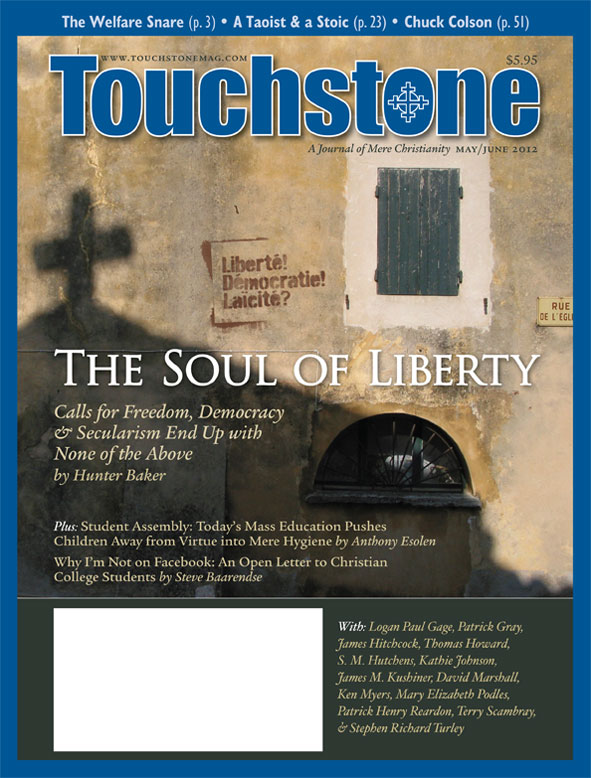Column: Contours of Culture
Musical Measures
by Ken Myers
One of the defining features of modern culture is the denial of an order in the structure of Creation. In The Abolition of Man, C. S. Lewis argues that until the advent of modernity, all human cultures assumed that the principal aim of wise living was to grow in the knowledge of “how to conform the soul to reality.” By contrast, the typically modern preoccupation (propelled by technological prowess) is with “how to subdue reality to the wishes of men.”
The task of conforming the soul to reality was assumed to be an aesthetic as much as a moral project. Training the young to love the beautiful was intimately associated with teaching them to submit to the order of goodness and truth. In Plato’s Republic, Socrates insists that “rearing in music is most sovereign.” The power of music to shape the soul—for good or ill—is a function of music’s participation in the cosmic order. Aristotle, in the Politics, similarly argued that “in rhythms and tunes there are likenesses particularly close to the genuine natures of anger and gentleness, and further of courage and moderation and of all the things opposite to these and of the other things pertaining to character.” So “we are altered in soul when we listen to such things.”
Until the eighteenth century—that is, until the Enlightenment’s exaltation of human ordering—Western culture in both theory and practice sustained the conviction that music had (in the words of James Gaines) an “allegorical and cosmic nature.” Gaines’s Evening in the Palace of Reason: Bach Meets Frederick the Great in the Age of Enlightenment vividly presents an account of how these convictions about music (and more generally about beauty and Creation itself) were repudiated in accordance with the same principles that would eventually deny the objective nature of truth and goodness.

The New Subjectivism
Long before Kant argued “that order was a quality of mind rather than the universe,” progressive thinkers interested in music were, reports Gaines, renouncing the claims that music was “a manifestation of the divine. To this generation, music was not to be written according to any higher theory or objective than that of sensual, aural pleasure.” He quotes composer and music theorist Johann Mattheson (1681–1764) who summarized the effects of the new subjectivism: “Rules are valid as long as I consider it well and sensible to abide by them. They are valid no longer than that. . . . The rule of nature, in music, is nothing but the ear.” And not principally the ear of the composer, but of the consumers:
Really we should follow not our own inclinations but those of the listener. I have often composed something that seemed to me trifling, but unexpectedly attained great favor. I made a mental note of this, and wrote more of the same, although it had little merit when judged according to its artistry.
As the subtitle to Gaines’s book suggests, the looming and heroic figure in Gaines’s story is Johann Sebastian Bach, whose greatest works were composed toward the end of his life, when popular opinion about the nature of music was least congenial to the convictions he was exemplifying. The “evening” in the title occurred in 1747, when the dashing young king of Prussia, Frederick the Great, invited “old Bach” to dine with him and entertain his court. Frederick was an accomplished amateur musician and an enthusiastic devotee of Enlightenment ideas. “Frederick represented all that was new and fashionable,” writes Gaines,
while Bach’s music had come to stand for everything ancient and outmoded. His musical language, teaching, and tradition had been rejected and denounced by young composers and theorists, even by his own sons, and Bach had every reason to fear that he and his music were to be forgotten entirely after his death.
A Musical & Moral Rebuke
Given the cast of characters and the world-historical tension they represented, the encounter between the two men was bound to be explosive. It turned out to be remarkably creative as well, at least on Bach’s part. Surrounded by many chic young musicians and apparently eager to make the evening entertaining, “Frederick gave Bach an impossibly long and complex musical figure and asked the old master to make a three-part fugue of it.” To improvise a three-part fugue. On a theme fiendishly constructed to be resistant to counterpoint. On the spot.
Old Bach succeeded with breathtaking eloquence. “When Bach had finished the three-part fugue, while his audience of virtuosi was still ‘seized with astonishment,’ Frederick asked Bach if he could go himself one better, this time making the theme into a fugue for six voices.” At this point, Bach asked for some time to meet the challenge. Weeks later, he sent to the king the result, which we know as the Musical Offering, a miraculous achievement that contains a musical and moral rebuke to the arrogant Frederick. Gaines’s account of Bach’s triumphant masterpiece is inspiring.
Gaines’s book stretches out before and after this single evening to present a dual biography of two dynamic figures who represent two ages of Western culture. Bach is presented as a loyal and creative (if somewhat ornery) citizen of the City of God, while Frederick—whose life was both grand and pathetic—clearly built his palace in the City of Man. As I read the book, I kept asking myself why it is that so many Christians are more sympathetic to Frederick’s self-centered understanding of music than to old Bach. The musical menu is meager in Reason’s palace.
—Readers may also be interested in Timothy A. Smith’s review of Evening in the Palace of Reason in the December 2005 issue of Touchstone and Lars Walker's Book Review: Evening in the Palace of Reason on Mere Comments in 2010. Both available at touchstonemag.com.
Ken Myers is the host and producer of the Mars Hill Audio Journal. Formerly an arts editor with National Public Radio, he also serves as music director at All Saints Anglican Church in Ivy, Virginia. He is a contributing editor for Touchstone.
subscription options
Order
Print/Online Subscription

Get six issues (one year) of Touchstone PLUS full online access including pdf downloads for only $39.95. That's only $3.34 per month!
Order
Online Only
Subscription

Get a one-year full-access subscription to the Touchstone online archives for only $19.95. That's only $1.66 per month!
bulk subscriptions
Order Touchstone subscriptions in bulk and save $10 per sub! Each subscription includes 6 issues of Touchstone plus full online access to touchstonemag.com—including archives, videos, and pdf downloads of recent issues for only $29.95 each! Great for churches or study groups.
Transactions will be processed on a secure server.
more from the online archives

33.1—January/February 2020
Do You Know Your Child’s Doctor?
The Politicization of Pediatrics in America by Alexander F. C. Webster
calling all readers
Please Donate
"There are magazines worth reading but few worth saving . . . Touchstone is just such a magazine."
—Alice von Hildebrand
"Here we do not concede one square millimeter of territory to falsehood, folly, contemporary sentimentality, or fashion. We speak the truth, and let God be our judge. . . . Touchstone is the one committedly Christian conservative journal."
—Anthony Esolen, Touchstone senior editor









